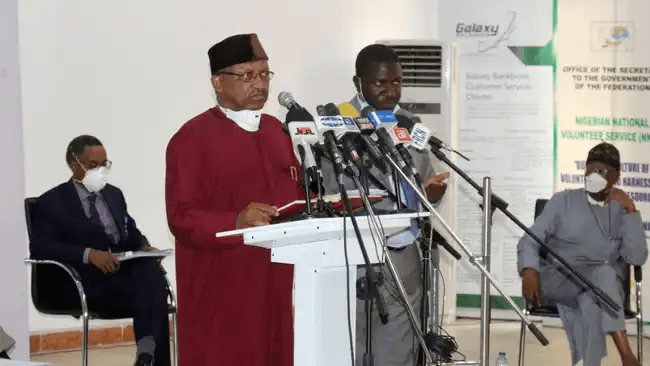A second review of the National Health Sector COVID-19 Pandemic Response Plan was undertaken by the Departments and Agencies of the Federal Ministry of Health, before the documents were submitted to other ministry stakeholders and partners on their way to a National Council for Health for final adoption. The next 2 weeks have already been scheduled for a special National Council on Health.
The journey started as an eight-man committee, the Honorable Health Minister, Dr Osagie Ehanire, reviewed and harmonized all existing COVID-19 initiatives into one comprehensive response plan to tackle the issue of community transmission, while endorsing measures that are already under way in response to the pandemic and ensuring the continuity of the concept.
The Minister also agreed to mobilize partners to support the Ministry with a view to facilitating the process and ensuring the presentation of a document reflecting the situation and meeting the needs of the health sector as a whole.
The partners include WHO, DFID and the Boston Consulting Group (BCG), all of which continued until it was ready to be validated on Friday, 19th June 2020, by the FMOH’s departments and agencies (DPAs).
The draft plan was submitted during the NHC, which took place on Tuesday 21st April 2020 and was noted by the Council. Since then, several draft papers have been circulated for review and comment to all the relevant departments, agencies. The relevant comments received from the DPAs were updated in each draft.
FMOH also discusses the document and as part of the process leading to its finalization, a special Top Management Committee (TMC) Meeting. Therefore, it can be concluded with confidence that the documents are the result of a thorough communication process and numerous assessments of all FMoH and WHO DPAs; they are supposed to address the needs of all health actors; they are also a single point of entry into the pandemic response to COVID-19.
The Honourable Minister of Health, Dr. Osagie Ehanire has since approved further steps that are to be taken following the validation meeting at FMOH’s DPAs’ level to include:
I. Convening a Special NCH to create awareness, endorsement and buy-in by States;
II. Presentation of the action plan document to the Nigeria Governors Forum;
III. Engagement with the Presidential Task Force on COVID-19 (PTF-COVID-19) to streamline the Health sector plan with the PTF- COVID-19 plan;
IV. Convening and Presentation of the National Health Sector COVID-19 Pandemic Response Action Plan to Health Partners Coordination Committee meeting.
Inputs from Federal Ministry of Health, Nigeria
The well-attended validation included officials of the Ministry’s departments, agencies and consultants on the document. Dr Ehanire supported the plan as an audacious effort in particular that those who worked for the plan made cost projections and were able to articulate the functions of each department and agency and projected the plan well over a three-year period, drawing on lessons from the management of the Ebola outbreak. Those who want to see the program will also anticipate seeing the expense estimates.
The plan was aimed at “making the current sense of urgency and national security concerns more effective in addressing the challenges of the perennial broad health system, enhancing value for money in delivering critical health services and increasing the resilience of the national health system.”
The plan aims to build on the “core mandates and competencies of MDAs to foster cross-agency synergy and learning.” The COVID-19 pandemic response plan of the integrated health sector would be crucial to ensure that there is a single integrated approach which eliminates unreasonable fragmentation, duplication and overlap, clarifies the adjacency and defines the responsibilities between ministries, agencies and ministries of public health.
Ensuring a holistic view of all problems of health management beyond COVID-19 (e.g. management of public hospital resources, family health), balancing resources, taking decisions and articulating related issues between COVID-19 and non-COVID-19 topics. To provide a holistic analysis of the financial tools required to tackle this pandemic, to promote post-pandemic recovery and to ensure the continuity of relevant health services that do not include COVID 19, and which follow relations with donors in order to achieve a balanced allocation of funds across Nigeria’s health priorities overall. The proposed Integrated Health Sector Response Plan is based on Pillar 4, Priority Area 1 of the NSHDP II, which encompasses the NCDC IAP (aligned to the PTF Pandemic Multi-Sectoral Plan). Besides the NCDC IAP, this Plan also includes and harmonizes in ‘ONE RESPONSE PLAN’ strategies for the various agencies concerned in the health sector at Federal level, including the Primary Health Care Development Agencies, Health Insurance Schemes, NAFDAC, NIPRD, NIMR, and private sector health systems.
The plan also covers support to the Federal Ministry of Health for enhanced health systems in the Member States to respond to the pandemic, describes strategies for maintaining the provision of essential sanitary services in the near-, medium- and long-term and also links to other multisectoral answers to COVID 19.
The program is built around three horizons in its operation: short-term, medium-term and long-term. It is planned to be flexible in order to meet increasing demands. In the near term (0-6 months), the emphasis is on rapidly implementing preventive and control measures to avoid COVID-19 spread. The medium-term (6-18 months) will resolve fluctuating cases with better understanding and management. The long term period is about 18-36 + months.
The health plan is anticipated to monitor transmission, decrease morbidity and mortality, protect and care for vulnerable populations, promote national health system action stewardship and collaboration, generate innovative financial and organizational funding and learning agenda. The Honorable Minister expressed his appreciation for the continued support of the work he has described as “significant” by WHO, DFID, through the Lafiya Project and the Boston Group (BGC) for the process and expressed hope “this document will lead us to end the pandemic in Nigeria.”
Data Source: Federal Ministry of Health, Nigeria




